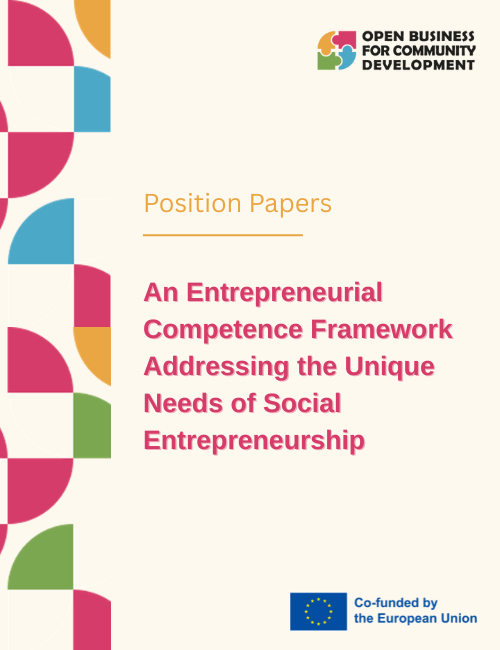Empowering Social Entrepreneurs: A New Competence Framework
As social enterprises (SEs) continue to grow and contribute to solving pressing societal challenges, the need for a tailored entrepreneurial competence framework has become increasingly evident. The existing EntreComp framework has proven to be valuable for general entrepreneurship but fails to address the unique needs of social enterprises. The Open Business for Community Development (OBCD) project, co-funded by the EU Erasmus+ Programme, has developed a comprehensive response to this gap: SEntreComp—the Social Entrepreneurship Competence Framework.
SEntreComp builds upon the widely recognized EntreComp framework but adds new competencies to better support social enterprises in balancing their dual mission: creating social value while ensuring financial sustainability. Through extensive research, OBCD has identified key areas where social enterprises require specialized skills to succeed, such as ethical decision-making, transparency, and social responsibility.
Why SEntreComp Matters
SEntreComp aims to provide a framework that addresses the specific needs of social entrepreneurship. This includes new core competencies like Social Literacy, which focuses on understanding and managing social challenges, and Managing the Dual Mission, which is essential for navigating the balance between social impact and economic viability.
The new competencies also emphasize Participatory and Open Governance, ensuring that social enterprises are transparent and accountable to their stakeholders, and Using Open Resources, which encourages collaboration and resource sharing—principles that have proven successful in scaling social enterprises.
Key Recommendations for Policymakers
To ensure the success of the SEntreComp framework, the OBCD has proposed three key recommendations:
- Adopt and Integrate SEntreComp: EU Member States should promote the adoption of SEntreComp in educational curricula, policy frameworks, and certification systems. This integration will help build a shared understanding of the competencies required for social entrepreneurship and support the growth and sustainability of social enterprises.
- Support Local Ecosystems: National and regional authorities should foster local ecosystems that encourage innovation and collaboration, ensuring that SEntreComp competencies are applied within these environments to maximize impact.
- Link Policies to Education and Support: National educational systems should integrate SEntreComp into vocational training, ensuring that social enterprises and their staff have access to the necessary skills to thrive. Additionally, policies should incentivize social enterprises that demonstrate proficiency in these competencies.
The Role of SEntreComp in Achieving EU Goals
The Social Economy Action Plan (SEAP) emphasizes the importance of social innovation and sustainability in the EU's strategy for strengthening the social economy. By adopting and applying SEntreComp, social enterprises will be better equipped to meet the EU’s objectives for inclusive growth, digitalization, and the green transition. SEntreComp will empower social entrepreneurs to build robust, sustainable organizations that can thrive while making a lasting social impact.
🚀 Learn more about: https://www.obcdproject.eu/policy-recommendations/



